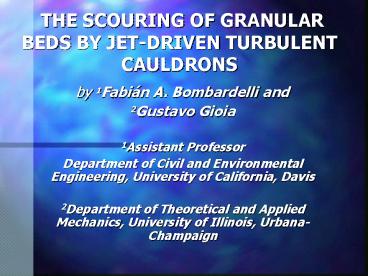THE SCOURING OF GRANULAR BEDS BY JETDRIVEN TURBULENT CAULDRONS
1 / 13
Title:
THE SCOURING OF GRANULAR BEDS BY JETDRIVEN TURBULENT CAULDRONS
Description:
THE SCOURING OF GRANULAR BEDS BY JET-DRIVEN TURBULENT CAULDRONS. by ... Department of Civil and Environmental Engineering, University of California, Davis ... –
Number of Views:91
Avg rating:5.0/5.0
Title: THE SCOURING OF GRANULAR BEDS BY JETDRIVEN TURBULENT CAULDRONS
1
THE SCOURING OF GRANULAR BEDS BY JET-DRIVEN
TURBULENT CAULDRONS
- by 1Fabián A. Bombardelli and
- 2Gustavo Gioia
- 1Assistant Professor
- Department of Civil and Environmental
Engineering, University of California, Davis - 2Department of Theoretical and Applied Mechanics,
University of Illinois, Urbana-Champaign
2
Motivation I
3
Motivation II
- Applications
- Erosion below dams
- Scour below flip buckets
- Scour downstream pipe outlets
4
Motivation III
- Notably large number of experimental evidence
from last century - Schoklitsch (1932)
- Veronese (1937)
- Eggenberger and Muller (1944)
- Kotoulas (1967)
- Chee and Padiyar (1969)
- Machado (1980)
- Mason and Arumugam (1985)
- Bormann and Julien (1991)
- Stein et al. (1993)
- DAgostino and Ferro (2004)
- Drawbacks of some formulas
- Lack of dimensional homogeneity
- Limited data
- Bed particle size is not included in some
formulas
5
Motivation IV
Problem idealization
- Questions
- Can we improve existing dimensional analyses?
- Can we obtain a completely theoretical expression
for the maximum scour depth? - Can we interpret physically the exponents of the
equation through the theory of turbulence?
6
Dimensional analysis and similarity
We assume INCOMPLETE SIMILARITY on d/R POWER LAW
Partial result. It depends only on one exponent
7
Phenomenological theory of turbulence and bed
shear stress
Based on two tenets a) The production of TKE
occurs at large scales b) The rate of production
of TKE is independent of viscosity
Large scales
ud
Zoom on roughness Small scales
8
Phenomenological theory of turbulence and bed
shear stress
We surmise that the excess of energy of the jet
converts to TKE
ud
The eddy close to the wall belongs to the
inertial sub-range
9
Phenomenological theory of turbulence and bed
shear stress
ud
Predicts nicely the scalings of Strickler,
Manning and Blasius (Gioia and Bombardelli, 2002,
PRL)
10
Phenomenological theory of turbulence and scour
equation
Kolmogorov-Taylor scaling
Shields stress
Final result a 1
11
Validation with experiments
3D, axisymmetric case Bombardelli and Gioia,
2005, submitted
12
Validation with experiments
R computed (m)
R measured (m)
13
Conclusions
- Dimensional analysis is a powerful technique but
it does not provide the values of the exponents.
The phenomenological theory of turbulence is the
key to address the dynamics. - The exponents are driven by the Kolmogorov-Taylor
scaling, signaling the effect of momentum
transfer (clear physical meaning). - The dimensional analysis in terms of the power of
the jet is crucial in exposing the correct
factors that govern the scour problem. - The final expression for scour is purely
theoretical and agrees with data and existing
formulas.































